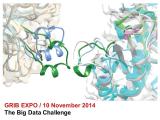
10/10/2014
Come to the GRIB EXPO the 10th November 2014
Come to the GRIB EXPO, a scientific exhibition on biomedical informatics research at GRIB. It will take place at Barcelona Biomedical Research Park (PRBB) the 10th of November with the participation of Philip E. Bourne as guest lecturer. You will have the chance to interact with scientist working on computational tools to shape the future of healthcare and drug discovery.
Participation is free and open to all academic, industrial or health organizations within the PRBB and beyond. Registration is compulsory. Please click here for registration or send a mail to coliver@imim.es.

13/10/2014
Nuria B. Centeno guanyadora del premi a la qualitat de la docència de la UPF
Nuria B. Centeno, investigadora del grup de FarmacoInformàtica del GRIB i coordinadora del Màster de Bioinformàtica per a les Ciències de la Salut (UPF/UB), ha estat guardonada en la darrera edició del Premis del Consell Social de la Universitat Pompeu Fabra en la categoria de qualitat de la docència, en la modalitat d'activitat dintre d'un màster universitari. El premi, que atorga cada curs el Consell Social de la UPF a les persones que excel·leixen en docència, va ser lliurat per la presidenta del Consell Social, Nuria Basi, a l'acte d’inauguració del curs acadèmic 2014-2015.

06/10/2014
OncodriveROLE predicts activating and loss of function cancer driver genes
The Biomedical Genomics group of GRIB announce a new member of the Oncodrive methods family: OncodriveROLE, an approach to classify cancer drivers into loss of function and activating roles. OncodriveROLE joins and complements the previously developed methods that identify cancer driver genes from the list of somatic mutations in cohort of tumors (OncodriveCLUST and OncodriveFM).
The manuscript describing OncodriveROLE is now published in Bioinformatics and freely available online. The method has been presented in a talk at the ECCB meeting in Strasbourg in September.
Article Ref: Schroeder MP, Rubio-Perez C, Tamborero D, Gonzalez-Perez A, Lopez-Bigas N. OncodriveROLE classifies cancer driver genes in loss of function and activating mode of action. Bioinformatics, 2014; 30(17):i549-i555.
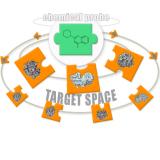
29/09/2014
Thesis Defence of Albert Antolin "The impact of polypharmacology on chemical biology"
On October, 9th at Marull Room (Dr. Aiguader 80, floor -1) at 12:00, Albert Antolin, member of the Systems Pharmacology group of GRIB will defend his thesis " The impact of polypharmacology on chemical biology". You are all invited to this event.
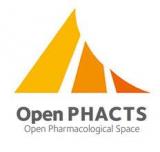
30/9/2014
Project Open PHACTS on track for sustainability
The Open PHACTS project has taken further steps along the path to sustainability for its outputs by launching a new version of its drug discovery platform and ensuring the long-term financial and technical viability of the infrastructure. Open PHACTS has developed a powerful cloud-based data platform that allows scientists to draw on diverse databases to answer all kinds of questions relating to drug development. The new version of the platform provides access to two additional data sets and also provides extra information on compounds. Elsewhere, the Open PHACTS Foundation has ensured the sustainability of the Open PHACTS Discovery Platform by funding secure hosting and organising the ongoing technical development of the infrastructure.
Several GRIB groups have contributed significantly to this european project, in particular the PharmacoInformatics group led by M. Pastor, the System Pharmacology group led by J. Mestres and the Integrative Biomedical Informatics group led by LI. Furlong and F. Sanz. As said M. Pastor: "the success of the Open PHACTS foundation demonstrates the value of the IMI projects outcomes and opens the path to similar initiatives. As promised, the Open PHACTS project is releasing a sustainable platform that can produce significant impact, increasing the productivity of biomedical research groups, both in industry and academia, for years to come".
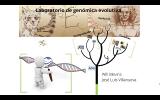
02/10/2014
GRIB Researchers in the PRBB Open Day
Once again, on Saturday October 4th, the Barcelona Biomedical Research Park (PRBB) will open its doors to the public from 10:00 to 19:00. Scientists and PRBB staff will explain what we do, how we do it and where we do it and will organize different kinds of activities. Researchers of GRIB collaborate on this event.
Jose Luis Villanueva and Will Blevins, from the Evolutionary Genomics Group at GRIB, will explain in the guided visits to laboratories what the genome is and how computational biologists are extracting useful information from it.
Albert Antolin from the Systems Pharmacology group at GRIB will give a talk at 12:00 at Charles Darwin Room about cancer drugs discovery.
More information about the Open Day
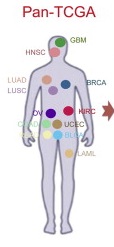
Classification of cancer according to their molecular profile could improve the outcome of the disease
Cancer is typically classified according to the tissue of origin. However, current possibilities offered by large-scale genomic studies allows to retrieve in detail the specific molecular profile of each tumor and classify the disease more accurately. By using the molecular profile of a multi-tumor cohort of 3,500 patients of the twelve most prevalent malignancies, a new taxonomy of cancer has been identified.
The results of this study were published in the August number of the journal Cell by the Cancer Genome Atlas consortium, led by the Buck Institute (USA) and with the participation of Nuria Lopez-Bigas, head of the Biomedical Genomics group of GRIB and ICREA researcher, and David Tamborero, a member of her group. As said Lopez-Bigas "This work is an unprecedented effort to take advantage of all the data generated by multi-platform large scale studies. This strategy aims to obtain a more accurate classification of each cancer patient to improve their diagnosis and treatment".
Hoadley KA et al. Multiplatform analysis of 12 cancer types reveals molecular classification within and across tissues of origin. Cell, 2014; 158: 929-944.

19/09/2014
The ESTIV Best Poster Award at Eurotox2014 goes to Chemotargets
Chemotargets, the spin-off of the Systems Pharmacology group of GRIB (IMIM-UPF), has been awarded with the European Society for Toxicology In Vitro (ESTIV) Best Poster Award at the conference Eurotox2014 held in Edinburgh (Scotland) last September.
The poster entitled "Computational prediction of off-target related risks of molecules: cardiotoxicity, hepatotoxicity, and reproductive toxicity" was done in collaboration with the pharmaceutical company Sanofi. The work shows how the prediction of the pharmacological profile of a molecule, made using the software CTlink developed at Chemotargets, allows for identifying relationships between unintended protein interactions (off-target) and different modes of toxicity.

18/9/2014
Parts of the genome without a known function may play a key role in the birth of new proteins
Researchers of the Evolutionary Genomics group of GRIB (IMIM-UPF) and the Universitat Politècnica de Catalunya (UPC) have recently published a study in eLife showing that RNA called non-coding (IncRNA) plays an important role in the evolution of new proteins, some of which could have important cell functions yet to be discovered.
“We have confirmed that in all six species that were studied –human beings, mice, fish, flies, yeast and a plant– many of the IncRNAs were associated to ribosomes and seemed to be ready to translate RNA into proteins. This suggests that they could act as a repository for the synthesis of new proteins” explains Mar Albà, ICREA professor and leader of the Evolutionary Genomics grup.
Article Ref.: Ruiz-Orera J, Messeguer X, Subirana JA, Alba MM. Long non-coding RNAs as a source of new peptides. eLife, 2014;3: e03523

16/9/2014
Interview to Magda Gayà-Vidal, a former student of GRIB
Click here to have a look to the interview to Magda Gayà-Vidal, a former student of GRIB, talking about the results obtained in her master thesis carried out in the Evolutionary Genomics group, which has been recently published.
Apart from talking about the most interesting results of that study (the identification of ~200 genes that have evolved more rapidly in humans than in other primates), it was also the opportunity to talk about research in genetics in plain language.
Article ref.: Gayà-Vidal M & Albà MM (2014). Uncovering adaptive evolution in the human lineage. BMC Genomics 15:599.



